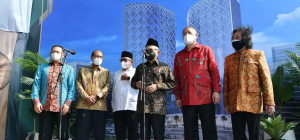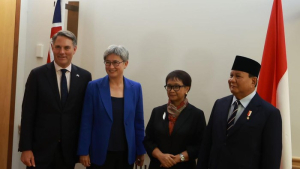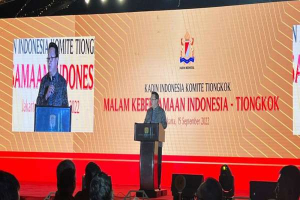What if China, Russia take profit from oil trading?
Chinese President Xi Jinping visited Central Asia in a post-COVID-19-pandemic series of meetings of the Shanghai Cooperation Organization (SCO) in Samarkand, Uzbekistan, on September 15 and 16, 2022. Xi's choice to make his first visit to the SCO showed the importance of the event.
SCO is an organization originally consisting of China, Russia, Kazakhstan, Kyrgyzstan and Tajikistan. The SCO was formed in Shanghai in 2001 at the initiative of China after the dissolution of the Soviet Union. On the sidelines of the SCO forum, Xi and Russian President Vladimir Putin met to discuss, among other things, the situation on the Ukrainian war as well as the United States' provocations in Taiwan after the visit of US House of Representatives' Speaker Nancy Pelosi. The two leaders coincidentally face elections in the near future to extend their respective mandates.
SCO has now grown to nine countries with the inclusion of India, Iran, Pakistan and Uzbekistan. In addition, there are several countries with the status of observers and dialogue partners. Regular guests of this annual meeting include ASEAN, CIS (Commonwealth of Independent States), Turkmenistan and the United Nations. In terms of geography and population, the SCO currently is the largest regional organization in the world, covering 60% of Eurasia, 40% of the world's population and 30% of global GDP.
Becoming permanent members
Iran and Turkey are two countries that have expressed interest in becoming permanent members. Turkey is even willing to relinquish its application to become a member of the European Union (which has been submitted since 1987, but has been suspended since 2016). Two days after the suspension, SCO intelligently appointed Turkey to chair the SCO Energy Club. It should be noted, that Turkey is a country whose dependence on imported oil, gas and coal is above 90%. But its geopolitical position as a geographical corridor to channel Russian and Iranian gas to market oil and gas in Southern Europe is used as a mutually beneficial bargaining position.
Iran is a country rich in natural resources. Since the Islamic revolution when Ayatollah Khomeini toppled the US-backed regime of Shah Reza Pahlavi, the country has been punished by the West. Various restrictions on oil production and exports were carried out in connection with Iran's adherence to the nuclear non-proliferation protocol. Iran as a country that was once the center of ancient civilization, if it succeeded in developing nuclear (even for peaceful purposes for example) would be suspected of being able to easily enrich uranium from electrical energy into nuclear weapons.
Western energy allies such as Saudi Arabia and Middle Eastern key players such as Israel are very concerned about this balance of power. Iran needs to be careful in its politics. The experience of Iraq -which was wrongly accused of possessing weapons of mass destruction - certainly does not want to befall Iran. The US, the International Atomic Energy Agency (IAEA) and other international partners in the JCPOA (Joint Comprehensive Plan of Action) monitor closely. Iran is horrified by this situation.
Oil and gas business
Iran has the second largest gas reserves in the world (33,721 billion cubic meters) behind Russia and the fourth largest in oil reserves (158 billion barrels). In 2021, Iran produced 256.7 billion cubic meters of gas and Russia 701.7 billion cubic meters. Meanwhile, the US, which ranks below Iran's reserves, produces 934.2 billion cubic meters (BP Statistical Review data, 2022).
Data as of August 2022 shows that out of 100 million barrels of world oil production per day, the US supplies 18 million barrels, while Iran only supplies 3.5 million barrels, far below Saudi Arabia's supply of 12.6 million barrels (IEA Oil Market Report as of September 2022).
In the war in Ukraine, the US pressured its EU allies to reduce dependence on Russian energy. The US also asked its partner countries and global allies to help the EU by supplying oil, gas and coal, to fill the gap to replace Russia.
Anticipating the long-term impact of energy volatility being played by the EU and the US, towards the end of July 2022, Russia, Iran and Turkey held a meeting in Tehran. The three countries have mutual interests in both geopolitically and energy geostrategy. During the trilateral meeting, Iran's Supreme Leader Ali Khamenei and Turkish President Recep Tayyip Erdogan shared a common view that the West is against an independent and powerful Russia. Putin, who chose the first foreign trip to Iran since the outbreak of the Ukraine war, smiled faintly. Putin gets the endorsement/blessing of the Iranian leader in his war in Ukraine.
What about China?
From the very beginning, China has never vehemently opposed the war in Ukraine. As called for in a joint communique with the BRICS (Russia, China, India, Brazil and South Africa) last July, they placed greater emphasis on dignified and respectable solutions, which were economically acceptable to the world.
The IMF corrected China's economic growth to decline by 0.3% from 3.7% in 2022. This was mainly due to recent developments in several cities that were locked down to control COVID-19, such as Shanghai, which affected consumption and supply chain disruptions.
There is an anomaly in this fact. Canada-based CREA data show that in the first 100 days of Russia's invasion to Ukraine, the largest importer of fossil energy from Russia was China (worth 12.6 billion euros), followed by Germany (12.1 billion euros). Russia's sales revenue was recorded at 93 billion euros. Revenue from sales of Russian fossil energy on average is 900 million euros per month. This number is already relatively the same as the figure at the time the war began in February 2022.
The CREA report shows that Russia is suffering from volume reductions and oil price discounts of 200 million euros per day. However, with high sales results, and China recording high imports, even though the economic growth rate is declining is an anomaly. It could be interpreted that China buys discounted oil from Russia, and then resells it to other countries at a higher price for margin. China is indeed a genuine smart trader. The report also shows that India increased its imports from Russia by 18%.
How about Indonesia?
National media have reported visits by high-level government delegations and corporate officials to Russia to secure supplies. But official reports state that Indonesia has not managed to get discounted oil from Russia. On the other hand, some reports suggest that the G7 countries might be upset if Indonesia buys cheap oil, as it can be interpreted indirectly as helping Russia in fighting Ukraine.
One Indonesian minister – who has an entrepreneurial background – has actually shown his enthusiasm. He openly said that Indonesia would succeed in getting discounted oil from Russia, with payment in rubles. As a former businessman, of course, he understands that it takes flexibility and courage to make a profit. It doesn't have to be all formal and official. Indeed, entrepreneurship means PRIVATE who must be brave like OFFICERS. It seems that our higher-ups, who are negotiating there, don't have the same knowledge and skills as the Minister. Or also not learning enough from BTP (Basuki Tjahaja Purnama, state-owned oil and gas company PT Pertamina commissioner) who once explained the meaning of cuan-cincai-cengli (profit, easy, fairness) and gave mutual benefits to both the supplier of the commodities and the buyer.
India, China, Turkey, Iran and various countries managed to trade with Russia and get cheap oil. Business is a win-win solution. Business is self-employed. It is not enough just to be normative. That is actually the essence of cuan-cincai-cengli. Acting as a submissive sweet child is not good enough.
Jakarta, September 2022
The writer is Defense University Alumni, majoring in Energy Geostrategy, and National Resilience Institute (Lemhanas) Alumni
Already have an account? Sign In
-
Start reading
Freemium
-
Monthly Subscription
30% OFF$26.03
$37.19/MonthCancel anytime
This offer is open to all new subscribers!
Subscribe now -
Yearly Subscription
33% OFF$228.13
$340.5/YearCancel anytime
This offer is open to all new subscribers!
Subscribe now






